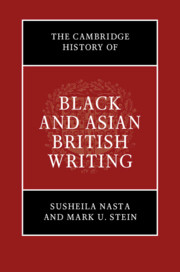Book contents
- The Cambridge History of Black and Asian British Writing
- The Cambridge History of Black and Asian British Writing
- Copyright page
- Dedication
- Contents
- Notes on Contributors
- Preface and Acknowledgements
- Introduction
- Part I New Formations
- 1 Narratives of Resistance in the Literary Archives of Slavery
- 2 Writer-Travellers and Fugitives
- 3 Exoticisations of the Self
- 4 Black People of Letters
- 5 Engaging the Public
- Part II Uneven Histories
- Part III Writing the Contemporary
- Select Bibliography
- Index
1 - Narratives of Resistance in the Literary Archives of Slavery
from Part I - New Formations
Published online by Cambridge University Press: 19 December 2019
- The Cambridge History of Black and Asian British Writing
- The Cambridge History of Black and Asian British Writing
- Copyright page
- Dedication
- Contents
- Notes on Contributors
- Preface and Acknowledgements
- Introduction
- Part I New Formations
- 1 Narratives of Resistance in the Literary Archives of Slavery
- 2 Writer-Travellers and Fugitives
- 3 Exoticisations of the Self
- 4 Black People of Letters
- 5 Engaging the Public
- Part II Uneven Histories
- Part III Writing the Contemporary
- Select Bibliography
- Index
Summary
This chapter focuses on modes of resistance in the writings of Ukawsaw Gronniosaw (1772), Ignatius Sancho (1782), Ottobah Cugoano (1787), Olaudah Equiano (1789), and Mary Prince (1831), who published some of the first publications in English by writers of African descent. The chapter describes their different backgrounds and explores how they used diverse literary forms, including letters, essays, polemics, and life-writing, to address a range of social and cultural issues. Comparative in focus, it examines how these writers’ published works can be linked through an analysis of the genres of life-writing and autobiography as narratives of resistance to slavery, the trans-Atlantic slave trade, and its inequalities and inconsistencies. It places these publications in the context of Enlightenment racism, and shows some of them, especially Equiano and Cugoano, were written in the context, and to advance the cause, of the campaign for the abolition of the slave trade. The chapter ends with a consideration of the literary legacy of this body of writing by showing how they have been reimagined by contemporary black British novelists.
- Type
- Chapter
- Information
- The Cambridge History of Black and Asian British Writing , pp. 25 - 39Publisher: Cambridge University PressPrint publication year: 2020

